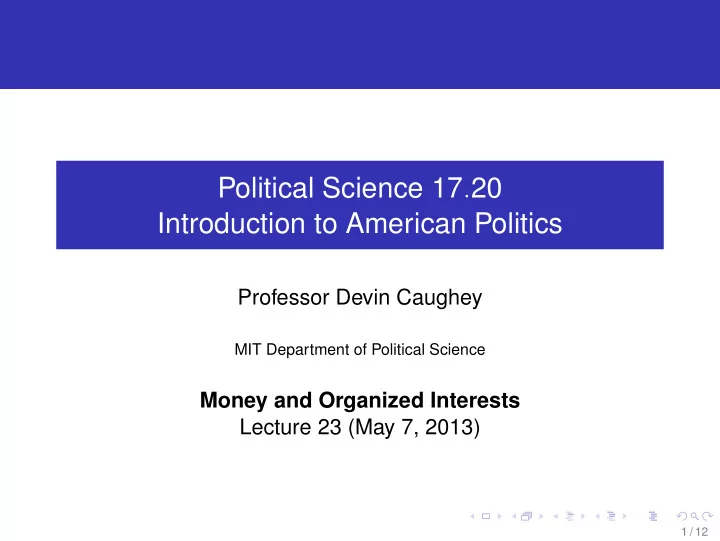

Political Science 17 . 20 Introduction to American Politics Professor Devin Caughey MIT Department of Political Science Money and Organized Interests Lecture 23 (May 7, 2013) 1 / 12
Outline Groups and Politics 1 Groups and Politicians 2 2 / 12
Outline Groups and Politics 1 Groups and Politicians 2 3 / 12
“Special Interests” vs. “Public Interest” We like to contrast “special interests” with the “public interest,” but this distinction is largely illusory—there is no single public interest, esp. when aggregating across all issues. Many different ways of aggregating: partisan politics (coalition of intense policy demanders) vs. interest-group politics (issue by issue) organized vs. unorganized 4 / 12
Pluralism Groups form naturally to defend their interests (“disturbance”) Fragmented, permeable structure of U.S. government and (then) weak parties → pluralist politics: bargaining among the relevant groups No single class dominates; policy mostly resolved by stakeholders. 5 / 12
Critiques of Pluralism Schattsneider: upper-class accent Gaventa: quiescence taken for consent Olsen: collective action problem means that groups will not spontaneously organize expressive, solidary, and selective benefits 6 / 12
Who Organizes? Small, concentrated groups with intense preferences Rule by intense minorities (ethanol) Sponsorship by outside actors (philanthopists, government) Decline of broadly based, participatory, cross-class organizations 7 / 12
Outline Groups and Politics 1 Groups and Politicians 2 8 / 12
What Do Organized Groups Offer Politicians? Groups offer politicians electorally valuable resources: Votes Labor Information Money (Personal interest decidedly secondary.) 9 / 12
The Puzzle of Money in Politics Endogeneity: donate because support, or support because donate? Little evidence of changing votes Why so little money? marginal return must be low. Consumers vs. investors, collective action Consumers can still bias politics (weighted votes) Get nowhere without money The market as prison 10 / 12
Lobbying Changing votes is hard—lobby supporters participation—"buying time" subsidizing work (writing bills, coordinating support, providing information and rhetoric) 11 / 12
How Do Interest Groups Change Politics? Politics is biased in favor of well-organized groups that can provide electorally valuable resources (yes votes, but also money). Baseline: all citizens counted equally But how to account for differential intensity? Are campaign finance regulations a violation of free speech? 12 / 12
MIT OpenCourseWare http://ocw.mit.edu 17.20 Introduction to American Politics Spring 2013 For information about citing these materials or our Terms of Use, visit: http://ocw.mit.edu/terms .
Recommend
More recommend